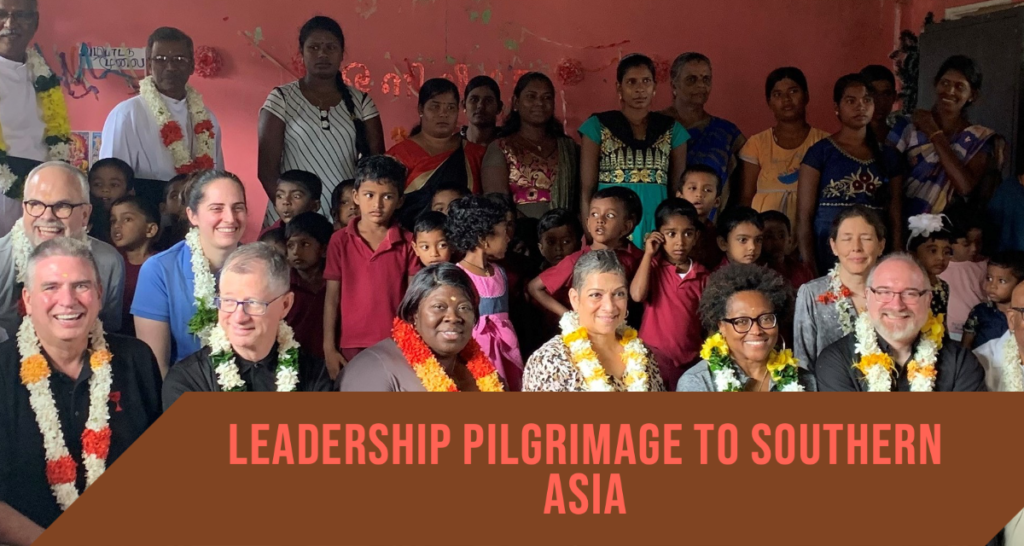Leadership Pilgrimage to Southern Asia
As part of the Southern Asia Initiative, eleven participants are on a pilgrimage in Southern Asia, including leadership from the Christian Church (Disciples of Christ), the United Church of Christ, and the United Church of Canada. There, participants will meet and visit various Global Ministries’ partners to celebrate relationships and to walk Together in Hope. The following reflections will take us through their pilgrimage and help us to more deeply understand the joys and challenges in the region so that we may be mutually encouraged by each other’s faith.
Day 1
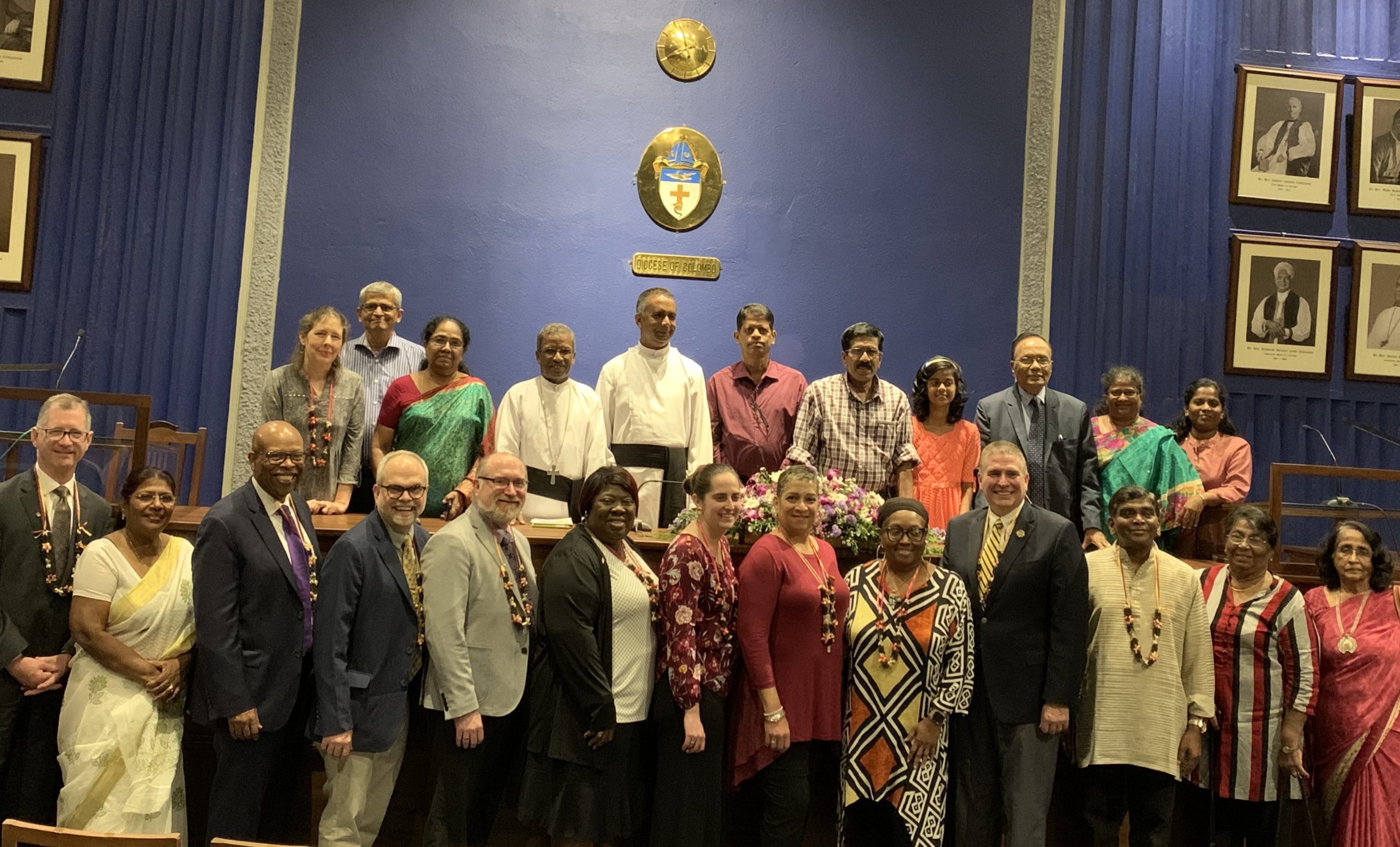
The eleven of us took a variety of routes to get to Sri Lanka, some through London, most through Dubai, but all were long. Sri Lanka is a long way from North America, where all of us live who are here on behalf of the Christian Church (Disciples of Christ), the United Church of Christ, and the United Church of Canada. But since we were met at the airport by people who knew our name and faces, and who are the spiritual descendants of members of our church who arrived here in 1816, we discovered that Sri Lanka really isn’t that far away.
We have started a two-week trip together to see the results of our church’s 200-year investment in the spiritual, educational, and medical welfare of this region; to be “living letters” representing the people of these nations to our home congregations, and to learn how to live faithfully as a Christian as a minority group inside a complex multi-faith and multi-cultural society. That is what the whole world is becoming, including the US and Canada, so conversations over the next days with Sri Lankan Christians could be most beneficial.
We were guests at a lovely reception this afternoon held at the Anglican Bishop’s Diocesan office and hosted by the Church of the American Ceylon Mission (CACM). A political officer from the U. S. Embassy came to say hello to the American visitors in town, and what is already becoming evident that is typical, our hosts welcomed her as they had welcomed us and she, too, received a beautiful and fragrant clove and seed lei.
Church officials and ecumenical leaders greeted us, and our two General Ministers and Presidents, John Dorhauer and Terri Hord Owens reciprocated. Global Ministries Southern Asia Executive Deenabandhu Manchala, who is leading our delegation, explained the purpose of our journey. We were encouraged to keep our eyes open and our ears open over the next several days. That should not be too hard to do since our hearts are already opened by the kindness with which we have been welcomed.
Rick Spleth
Regional Minister
Christian Church in Indiana
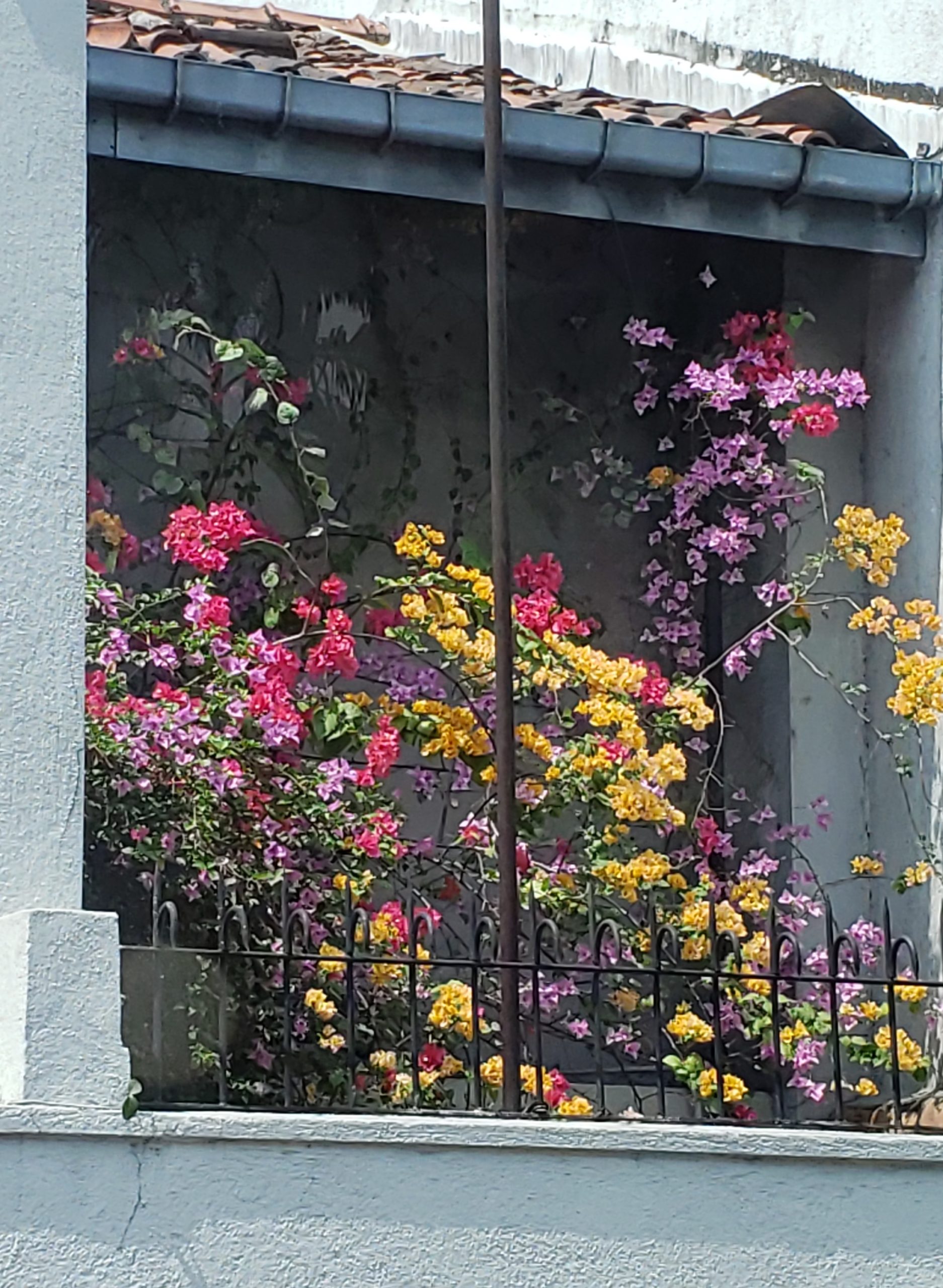 Day 2
Day 2
Today the day began with a dialogue about the current realities in Sri Lanka facilitated by the Ecumenical Institute for Study and Dialogue. A panel hosted by Dr. Marshal Fernando and Professor Youngwood led the delegation in a deep discussion on the relationship between religion and the ethics of democracy. In the context of rapid political change, including the recent move in Sri Lanka from parliamentary governance to a strong presidential system, there is a deep concern for the future of the country. Four Sri Lankans from varied backgrounds shared insights into the relationship between religion and democracy and the critical and necessary role of interfaith dialogue.
Insights on how they moved towards interfaith dialogue were provided by the former Anglican Bishop Duleep de Chickera who stated that as Christians, the belief in the unseen God as flesh among us allows acceptance of vulnerability as we enter into hearing others and their truths. He shared that we must develop a new language for this interfaith conversation and begin that with silence. We left with the understanding that this is not an esoteric conversation in Sri Lanka. There are families are comprised of both Buddhist and Christians, blended communities of Christian, Muslim, and Buddhists and that interfaith dialogue is not an optional conversation but an integral component of the reality of Christian Sri Lankans.
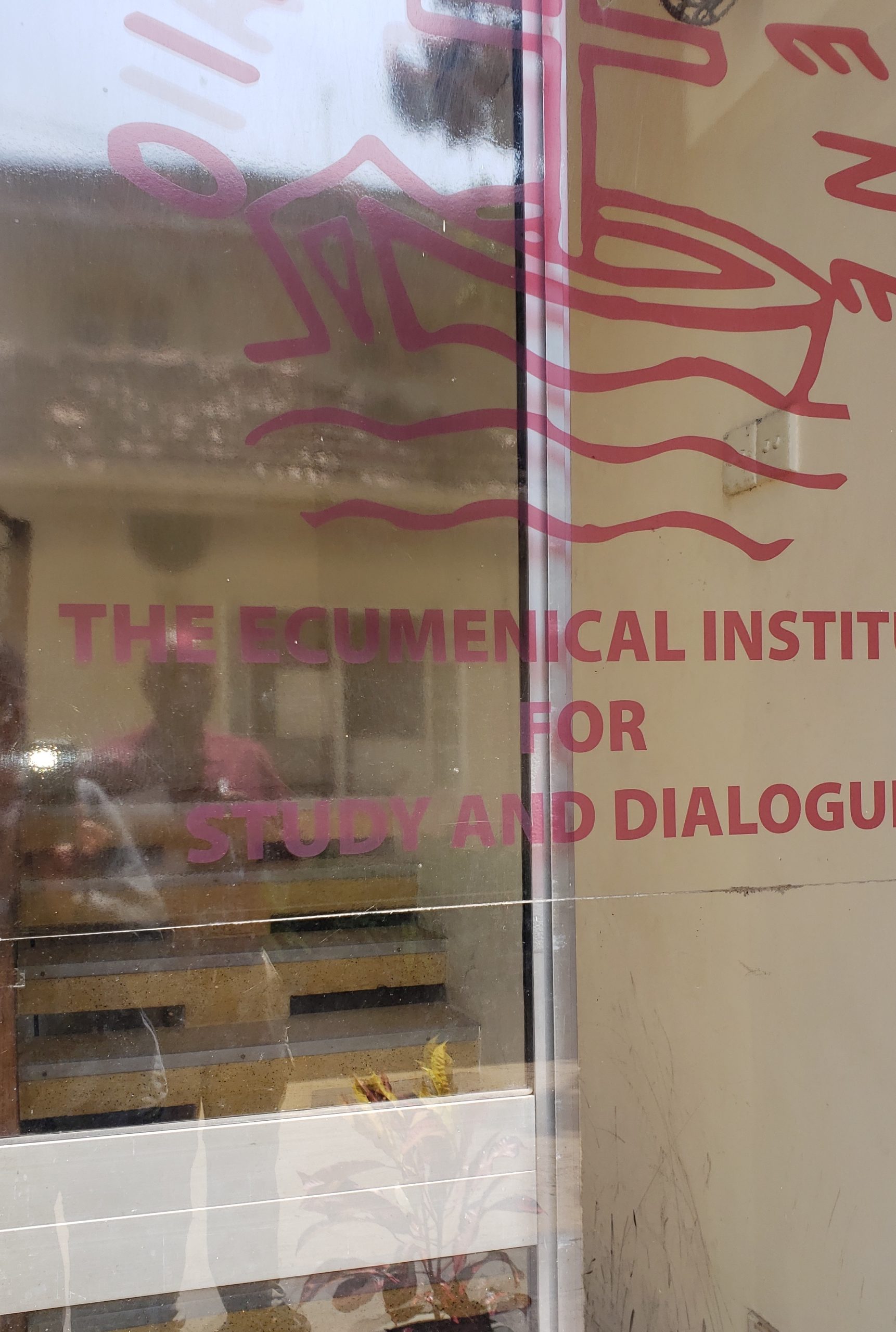 This deep conversation was followed by time to reflect with a ten-hour bus ride along the coast of Sri Lanka to the north of the country. We arrived late in the evening, after crossing through military checkpoints that marked the transition to the area deeply affected by the civil war. We entered the city of Jaffna with images of the lives of daily people we saw: yards with flowers, towns with Buddhist statues, and rice paddies with egrets etched in our minds. On the bus, we had some prayer, some songs and many hours of silence thinking about our own context of political change, the role of the church in that conversation and the parallels in what we heard.
This deep conversation was followed by time to reflect with a ten-hour bus ride along the coast of Sri Lanka to the north of the country. We arrived late in the evening, after crossing through military checkpoints that marked the transition to the area deeply affected by the civil war. We entered the city of Jaffna with images of the lives of daily people we saw: yards with flowers, towns with Buddhist statues, and rice paddies with egrets etched in our minds. On the bus, we had some prayer, some songs and many hours of silence thinking about our own context of political change, the role of the church in that conversation and the parallels in what we heard.
Catherine Nichols
Executive, Mission Personnel
The Road to Jaffna
There is a road
From Colombo to Jaffna
It twists and turns
With memory and hope.
Twelve years impassable.
Now it has become
What seemed impossible.
More artery than asphalt
More passage than pavement
It pulses with possibility
Not long ago implausible.
This is the road
Of the broken heart
The hopeful heart
That beats at times irregular
With blockages along the way
Yet we have come
to ride this road
to witness to what the world
all around
now seems
to resist.
The road of resurrection
Unrelenting in its hope.
Uncompromising in its vision
Undying in its love.
Yes! Yes! Yes!
There is a road.
Rev. Dave Long-Higgins
Transitional Conference Minister
Heartland Conference, United Church of Christ
Serving Ohio, West Virginia, and Northern Kentucky
Day 3
Today was a full day of engagement with our partners and their communities, as we listened and learned more about the particular Sri Lankan context. The history of the missionaries who came to what was then Ceylon in 1816 was recounted for us by several people, and the passing on of this tradition is of great importance. We visited the first churches established at Tellipalli and Vaddukoddai, and then visited the gravesites of some of the first missionaries, paying our respects with flower petals and prayers. I was reminded of the special places in Disciples of Christ history that mean so much: Bethany, WV and the grave of Alexander Campbell, and Cane Ridge, KY, where the Stone-Campbell movement began. This was their “God’s Acre,” and we felt the reverence our partners hold for those who came to this island over 200 years ago.
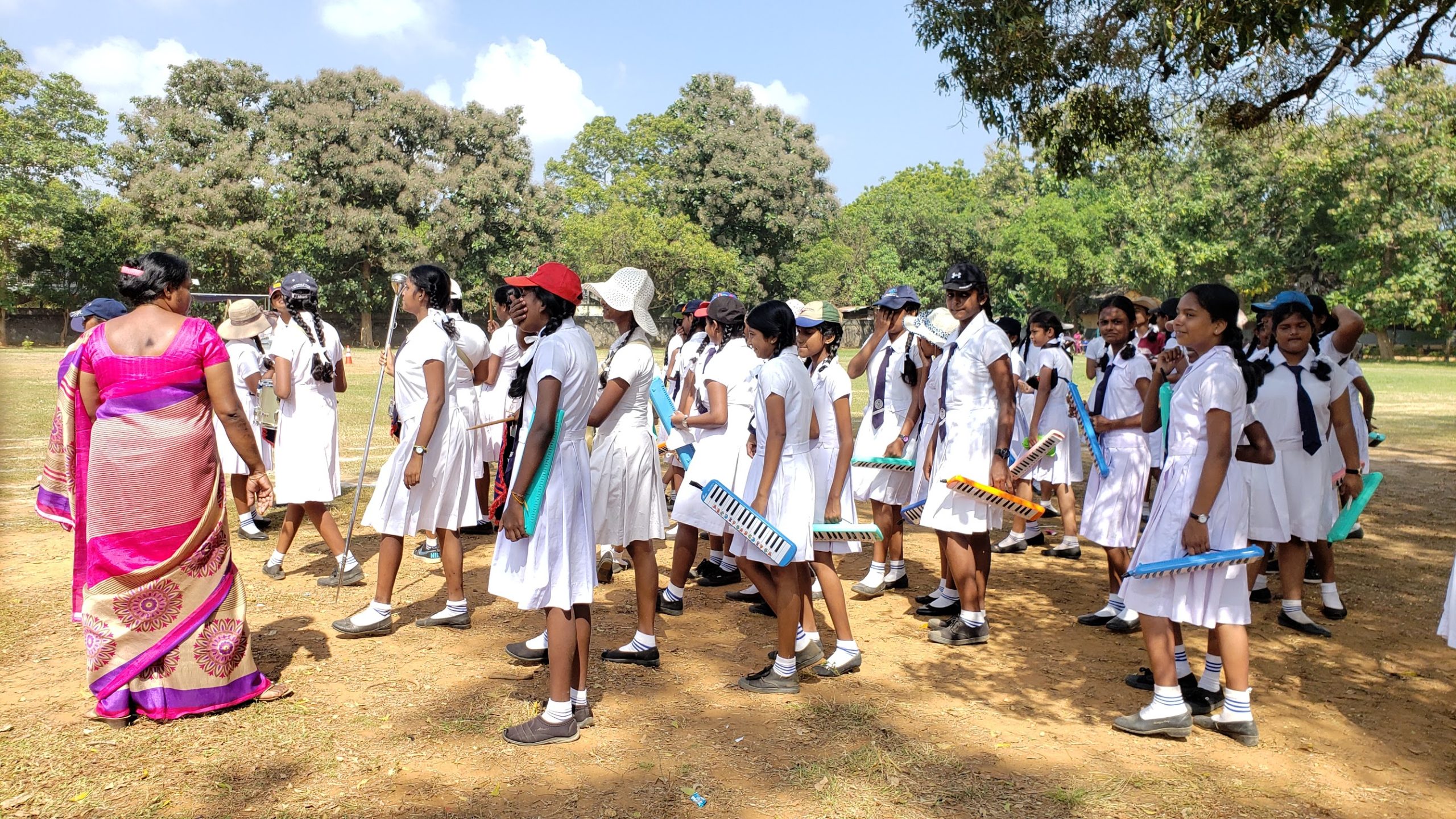
We visited other sites that mark history for the CACM: Uduvil’s Girls’ College, the first all-girls’ school, and the Medical Mission at Manipay. With 1248 students, Uduvil is a bridge to the future from the past. Student leadership was evidenced by the head prefect and a fabulous all-girls marching band, complete with a tight drumline. The Medical Mission still functions as a health clinic and represents a legacy of medical education being conducted in Tamil to develop capacity for healthcare for the Tamil people.
Another contextual current reality: During a 28-year war, whole communities were displaced, buildings were destroyed and many lived for years in refugee camps. In the midst of uncertainty, community relationships were formed to meet needs, and a whole generation of “war babies” grew up with the displacement as all they had ever known. Local pastors shared with us their vision to develop more schools within walking distance of their newly restored neighborhoods. Pastors want to create after-school programs, space for Sunday School, and room for psycho/social programs to minister to people who have experienced collective trauma for years. They hold fast to these plans while still rebuilding homes and churches destroyed by war.
Lunch at Christian Theological Seminary allowed for discussion with other local clergy and seminarians. Global Ministries’ support of CACM students at US seminaries is building capacity for new clergy leadership. They return to serve a Tamil community still recovering from the devastation of war. “What gives you hope?” asked Richard Bott, Moderator of the United Church of Canada. The response, “Ministry is hope-giving.” The flourishing of their people is paramount for these clergy. Bringing our day to an end with an ecumenical gathering, we heard our Sri Lankan siblings challenge one another to address injustice, to not be complicit with silence. We each felt the challenge to ask ourselves how God is calling us to make justice real in our own context. We must, as one powerful woman stated, move 10 steps forward. We must dare to imagine God’s reign fully come, and how we can participate with God and our partners in making it so.
Rev. Teresa “Terri” Hord Owens
General Minister and President
Christian Church (Disciples of Christ) in the United States and Canada
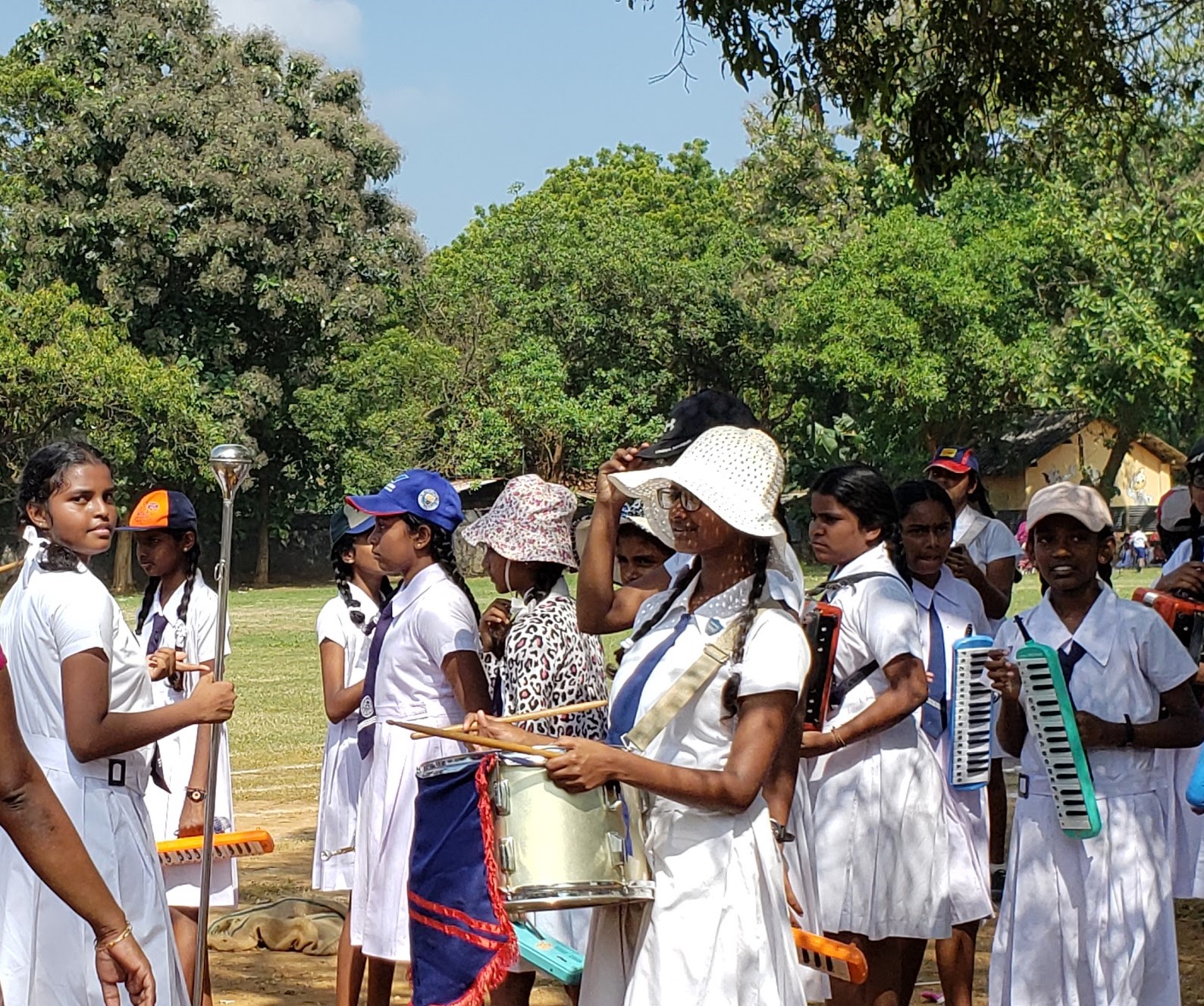 The Best Band in Sri Lanka Land
The Best Band in Sri Lanka Land
Like any band
They had a beat.
But theirs was not
The beat of any band.
No, the pulse of these players
Was a rhythm of refusal
A drumbeat of determination
A missional march.
A soul-filled song
That took the cries of the land
And pounded the ground
With resilient grace.
Their instruments unusual
Too quiet alone to be heard.
But together they played
So that all understood…
No fear from the past
Could command this band.
These daughters of determination
These young women of wonder
Had a song to be played
And a march to be made.
Their drum-line a yes
To the no of the past.
Their synchronized moves
A dance that will last.
Inspired they blew
Their instruments to life.
And as they did
They marched beyond strife.
Oh, yes, there’s a band
Down Uduvil way.
And it will not be silenced
It must play every day.
This sisterhood of justice,
With their songs of hope.
And a beat all their own.
See how they’ve grown.
Now many lands
Have many bands.
But this band of hope
Surely must be
the best band in all
of Sri Lanka land.
Rev. Dave Long-Higgins
Transitional Conference Minister
Heartland Conference, United Church of Christ
Serving Ohio, West Virginia, and Northern Kentucky
Day 4
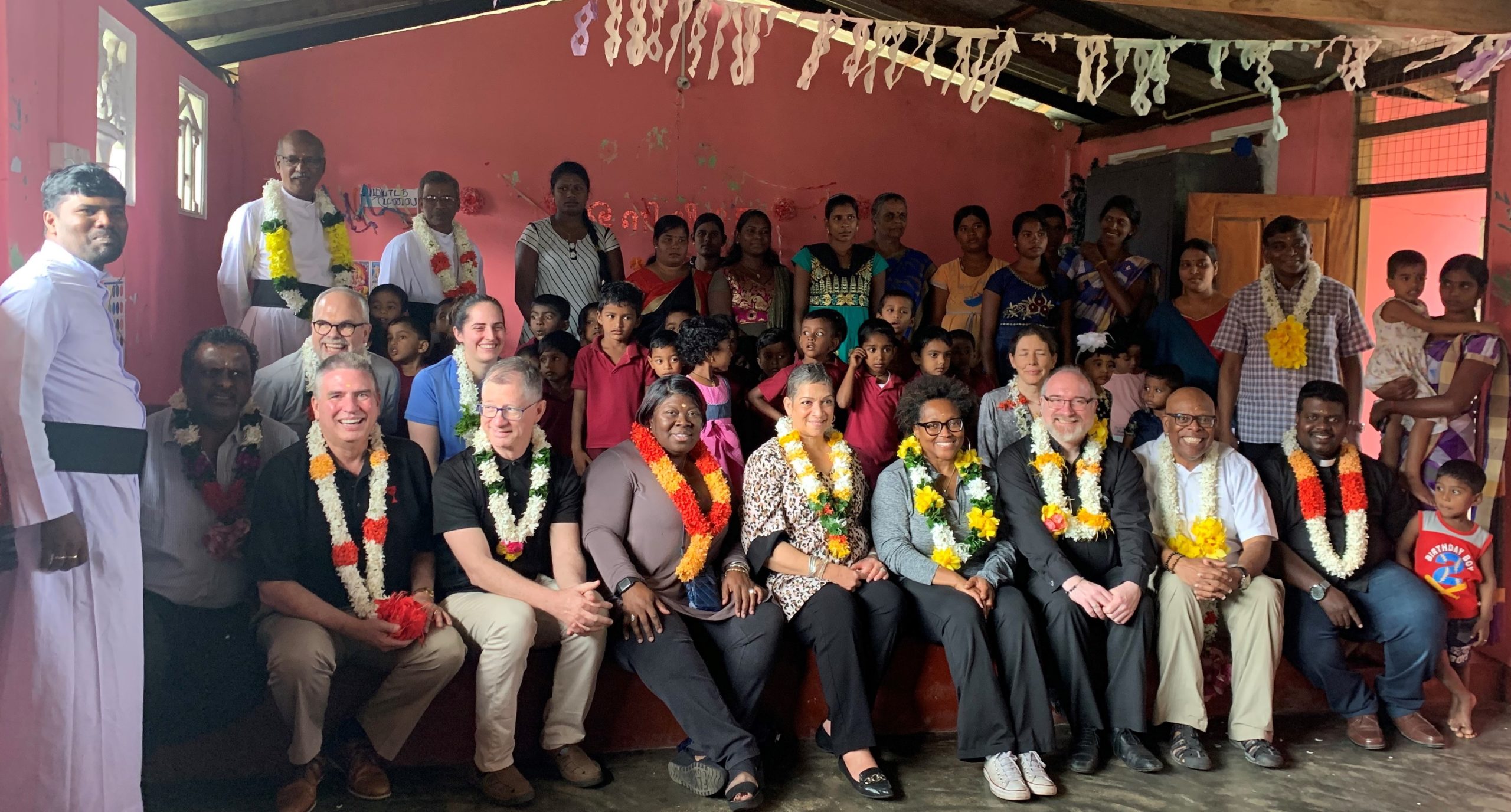 When I accepted a call to ministry almost two decades ago, little did I know, and even less did I ever imagine, that this call would lead me almost ten thousand miles from home to the Wanni region in the northern part of Sri Lanka. Yet here I am, with Global Ministries, on day four of our pilgrimage to Southeast Asia. The Wanni region was a beachhead during the Sri Lankan Civil War which lasted from 1983 through 2009. The people of this region experienced devastating losses during this war in which the Liberation Tigers of Tamil Eelam ( ‘the Tamil Tigers’) fought for the establishment of an independent state for the Tamil peoples in this portion of the country
When I accepted a call to ministry almost two decades ago, little did I know, and even less did I ever imagine, that this call would lead me almost ten thousand miles from home to the Wanni region in the northern part of Sri Lanka. Yet here I am, with Global Ministries, on day four of our pilgrimage to Southeast Asia. The Wanni region was a beachhead during the Sri Lankan Civil War which lasted from 1983 through 2009. The people of this region experienced devastating losses during this war in which the Liberation Tigers of Tamil Eelam ( ‘the Tamil Tigers’) fought for the establishment of an independent state for the Tamil peoples in this portion of the country
What was remarkable, even miraculous, about our visit to the Wanni region was the faith of the people, some who were forced to leave their homeland and who lost life and limb as a result of this conflict. It made for a powerful day, from the moment we were welcomed with exquisite leis and a dance performance by children at a pre-school, to hearing experiences of violence and destruction difficult for us to fathom. Despite all the adversity they had been through, we saw the people of the Wanni region rebuilding their lives and their communities, thanks in no small part to the ministry of our hosts and our ecumenical partners, the Church of the American Ceylon Mission.
The witness of the people this day brought to mind the experience of the people of Israel, who too had experienced the horror of war and the despair of exile after the destruction of Jerusalem. The people wondered in Psalm 137:4 (NRSV), “How could we sing the Lord’s song in a foreign land?” Yet, like Israel, the people of the Wanni region, through their faith in God, found a way to sing.
Moreover, it was abundantly clear that the song our delegation heard this day was one, recalling a song by gospel artist Myrna Summers, that the angels cannot sing. It was one of resurrection interspersed with hope, its melody resounding in the hearts of our delegation and reaching up to highest heaven. And it was a song we will not soon forget.
Rev. Freeman L. Palmer
Conference Minister
Central Atlantic Conference United Church of Christ
Day 5
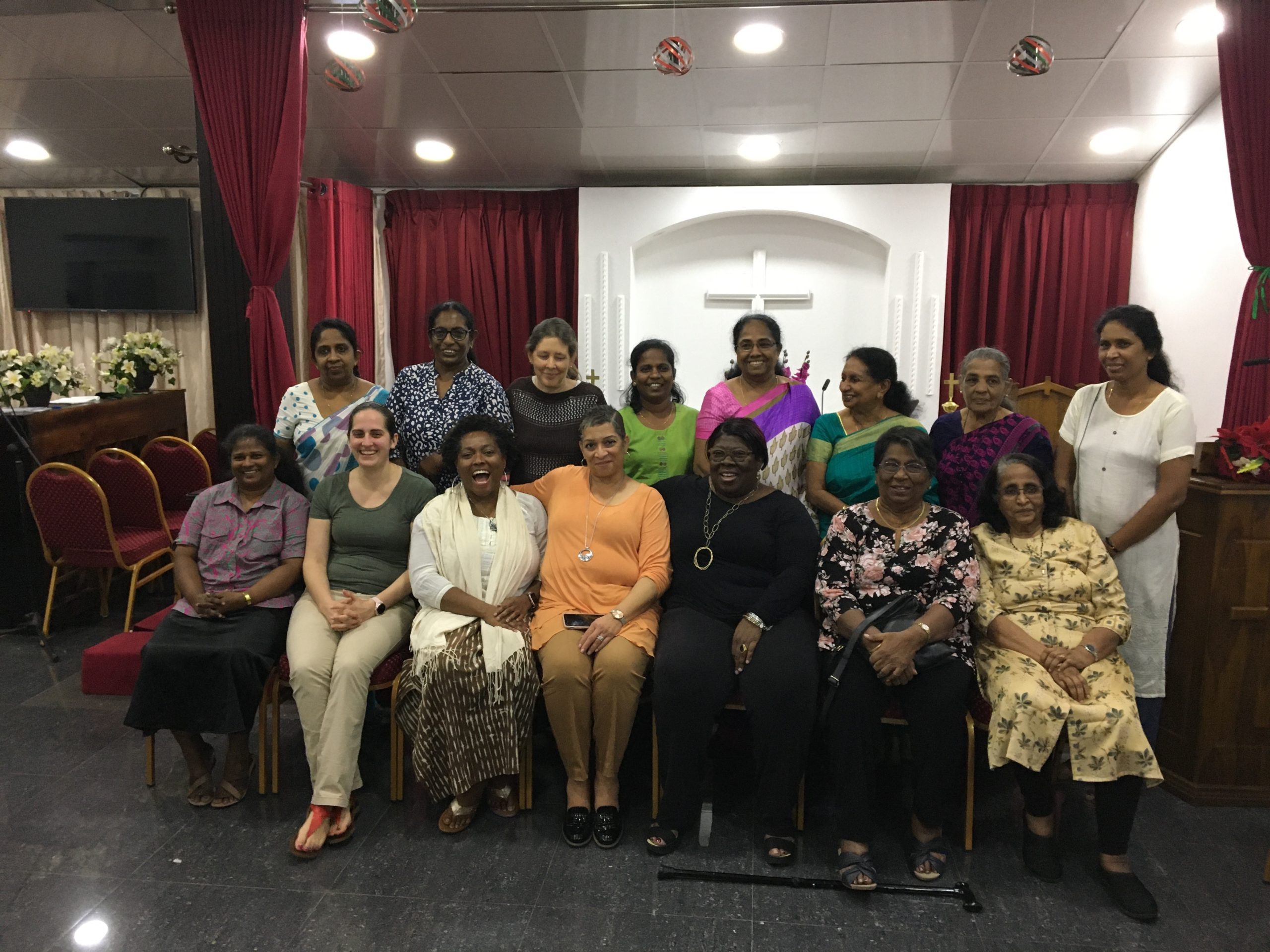 There are days when there is a holy pause in the letter that is being written on one’s heart and one is given space to reflect, savor, and give thanks. Today was such a day. The morning took us on a tour of Colombo, a city and metropolitan area of some 5.6 million people. It is a city on the sea. Like many cities, Colombo is a collection of contrasts. Here new skyscrapers are set alongside remnants of the civil war. But as in all cities, there is the beauty of the people, women in their colorful saris and the sound of children laughing.
There are days when there is a holy pause in the letter that is being written on one’s heart and one is given space to reflect, savor, and give thanks. Today was such a day. The morning took us on a tour of Colombo, a city and metropolitan area of some 5.6 million people. It is a city on the sea. Like many cities, Colombo is a collection of contrasts. Here new skyscrapers are set alongside remnants of the civil war. But as in all cities, there is the beauty of the people, women in their colorful saris and the sound of children laughing.
We noticed the complex relationship of religions seeking to live side by side in an often uneasy and even tragic relationship. This we especially noticed as we visited St. Anthony’s Shrine, a site of one of the Easter Sunday bombings last year. But the vestiges of tragedy were not the only thing we saw. There was also beauty. We saw it in a Buddhist temple and in various shrines of different religions along the way – signs which speak to the ennobling of the human heart.
We became aware again and again that this tiny country off the coast of India is not some isolated island. It is both an influence in the world and influenced by the world, especially noted as Chinese investment creates a new shape to the city and country with developments that literally stretch into the sea.
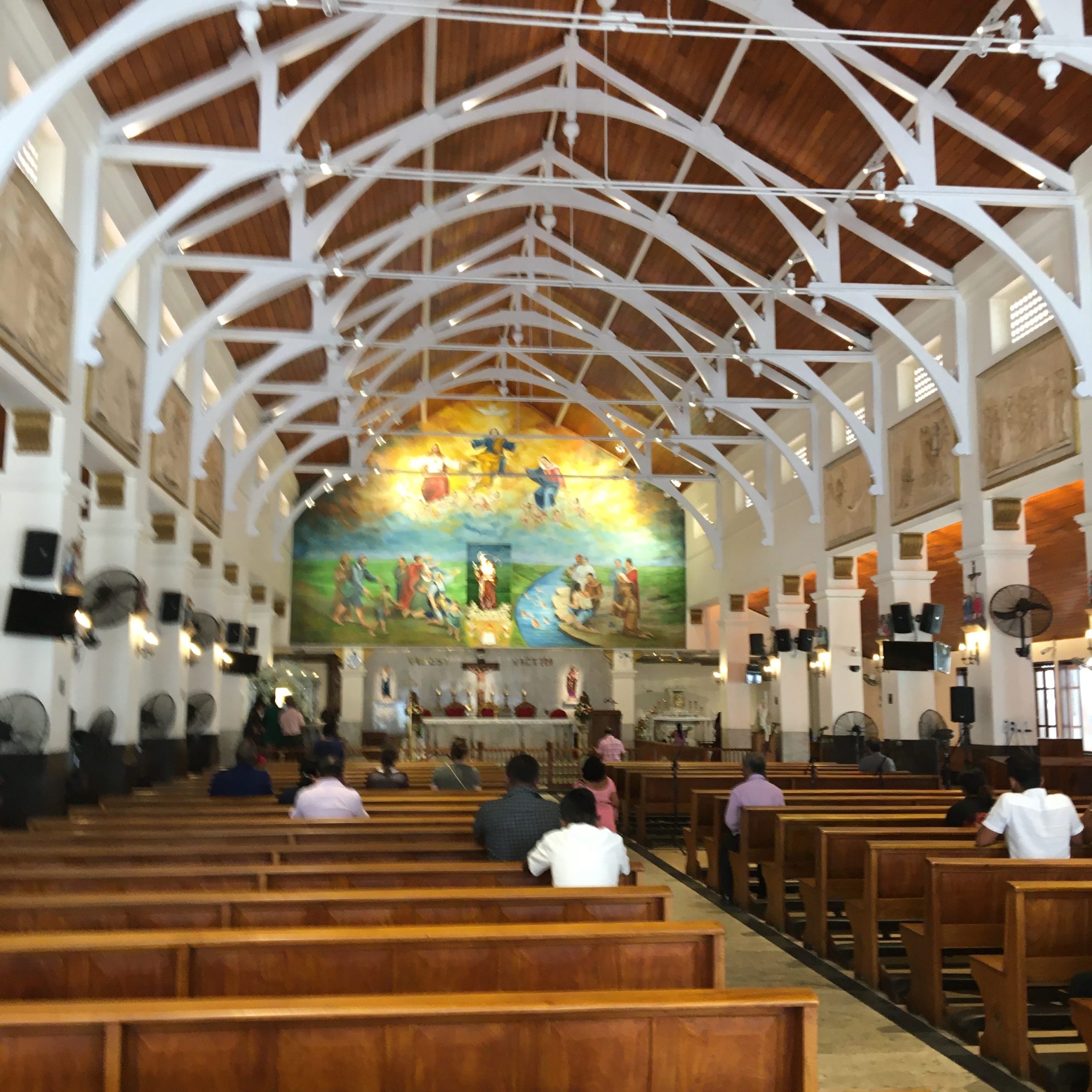 But our tour on this day was not just about the city sights. It was also a tour of the geography of our hearts as we gathered one last time with members of the Church of the American Ceylon Mission, visiting one of the churches in Colombo. Approaching the space in which this particular church gathers, there is no steeple to mark its presence. This church relies on something more powerful and enduring than such architectural wonders. It is the magnetism of God’s love that draws people to this space. These people whom God has formed in Christ Jesus are living stones of witness offering an alternative to the violence or exclusion that so often defines life.
But our tour on this day was not just about the city sights. It was also a tour of the geography of our hearts as we gathered one last time with members of the Church of the American Ceylon Mission, visiting one of the churches in Colombo. Approaching the space in which this particular church gathers, there is no steeple to mark its presence. This church relies on something more powerful and enduring than such architectural wonders. It is the magnetism of God’s love that draws people to this space. These people whom God has formed in Christ Jesus are living stones of witness offering an alternative to the violence or exclusion that so often defines life.
So we too were drawn to this holy haven of joy and celebration. And there we remembered together what we had seen and heard in so many different places and in so many different directions. We remembered the power of women who often have found themselves as single parents due to war and thus also were the breadwinners of their households. We heard a pastor’s powerful vision for fashioning a comprehensive culture of inclusion both for the church and the society at large.
We paused and remembered children – some dancing and others marching in a band. We remembered the call of critical presence which begins by listening to each other’s stories, especially the way in which suffering has shaped life. But not only suffering. We also heard about hope grounded in the Gospel, rising up again and again. By all of these things and so many more, we have been changed through the miracle and blessing of a loving God who continues to write upon our hearts.
And so now, we head on our way to Bangladesh. But the love letter of Sri Lanka is not finished. Indeed it is a letter over 200 years old that continues to be written. Thanks be to God!
Rev. Dave Long-Higgins
Transitional Conference Minister
Heartland Conference, United Church of Christ
Serving Ohio, West Virginia, and Northern Kentucky
Day 6
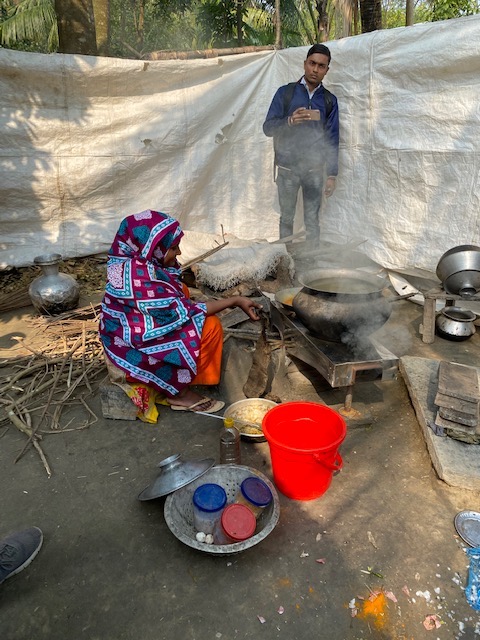 As we began settling into the chilly morning of day six, nestled within the amplified calls to prayer, speed bumps, and tricycles and motorcycles, we conquered the three and half hour ride to The Christian Commission for Development in Bangladesh(CCDB), located in Pathergata.
As we began settling into the chilly morning of day six, nestled within the amplified calls to prayer, speed bumps, and tricycles and motorcycles, we conquered the three and half hour ride to The Christian Commission for Development in Bangladesh(CCDB), located in Pathergata.
This organization is formed to address the complexities of climate change and it’s effects on individuals, families, land, and the economy.
The focus of the program is:
- Knowledge – Making sure as many folks are educated about Climate Change and its effects through classes, conversation, and research.
- Experience – Visitors and community are invited to see first hand the effects of climate change – while at the same time witnessing the resiliency of those who are vulnerable.
- Capacity – Through community ownership, organizing opportunities for creative and innovative ways of
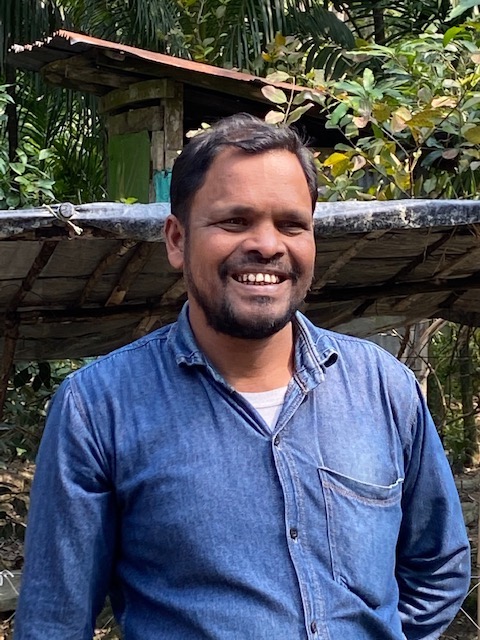 rebuilding, gardening, and educating youth and others around a better future.
rebuilding, gardening, and educating youth and others around a better future. - Engagement – The willingness to engage partners, colleges, and universities in a collaborative fashion in order to build a network of relationships to get the word out about the effects of climate change.
CCDB is an advocate for “the poor to the international.” The four pillars of the Climate Change Program are:
- Community Resilience
- Climate Technology Park
- Emission Reduction
- Research Advocacy and Capacity Development
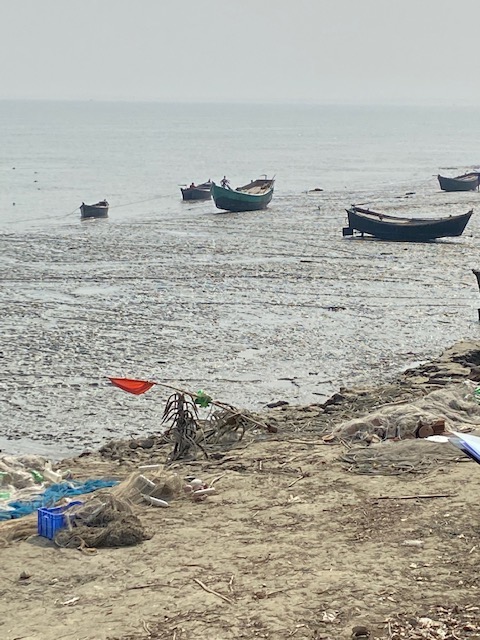
Upon our arrival, we were introduced to the leaders and they fed us breakfast. Breakfast would offer us the stamina needed to take another car ride deeper into the village towards the most southern tip of Bangladesh where we could clearly see some of the erosion. In this village, more than 3,000 households (15,000 people) were forced from their homes near the river and Bengali Sea due to cyclones and high tides. The displaced were living outside the embankment and had lost their family members, homes, and jobs. Now, they are gathering work on fishing boats to support their families. The wages are extremely low.
We then visited the CCDB Seed Preservation Center. The seed preservation center is a cooperative and ingenuity of community resilience. This center has training around Disaster Preparedness and Relief. In 2019 alone, they experienced more than 9 cyclone warnings. We witnessed the creation of organic pesticides through the use of natural managing seeds, palm oil, and other ingredients. We were able to listen and share in stories of community engagement, and amazing resilience.
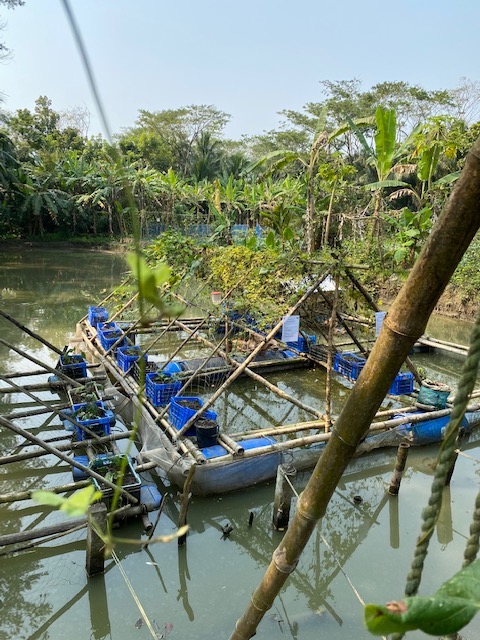 Finally, we visited the Hanging Garden Program. The community has learned how to create a gardening program where plants and vegetables are grown up high in bags and pots in order to keep the foods from being affected by the eroded waters of the sea.
Finally, we visited the Hanging Garden Program. The community has learned how to create a gardening program where plants and vegetables are grown up high in bags and pots in order to keep the foods from being affected by the eroded waters of the sea.
With climate change happening around the world, we all need to think critically, about sustainability for the whole world. It seems all of our lives will someday depend on it!
The Rev. Dr. Christal L. Williams
The Christian Church (Disciples of Christ) in Tennessee
Day 7
From classroom, to field, to church, to the air, to an evening of dance, song, and conversation with fellow disciples on Christ’s Way – it makes for fullness in a day!
Our morning began at the Gournadi offices of the Christian Commission for Development in Bangladesh, exploring with area leadership the patterns CCDB has laid out to help communities living with little resource develop themselves. Forums (small groups) gather, where the people are trained in organizational, health, gender equity, and decision making principals and skills, as well as the growth of skills relevant to the focus of the forum. As forums gain the skills, the CCDB pulls back in three phases, until the forums are standing on their own.
It’s a pattern that has worked, over and over, in communities in Bangladesh. A forum of women invited us to their community and shared with us what the forum has meant to them. From gardens with cash crops as well as sustenance plants to a bio-fuel factory from chicken droppings to box-makers and fan-weavers, they showed us not only what they are doing, but the powerful dignity and the strong voice they have found in what they have learned and done. In bringing the forums together, the CCDB has helped what I understood to be a credit/savings union to come together – building savings and sharing capital for new projects.
After meeting with Bishop Sourav Phalia, bishop of the newest Diocese of the Church of Bangladesh, hearing about the ministries of education and congregational support, and sharing a meal together, we headed to Dhaka, to meet with the National Council of Churches in Bangladesh and their affiliates.
It was clear that there are struggles being a minority religion in the country. Christians make up a tiny percentage of the 165 million people who live there.
But, repeatedly, from the CCDB forums growing in communities, regardless of faith, to the work of the wider Christian community, we were graced by the witness of Jesus’ disciples living out the call to love God with all they are, and to love their neighbour as they love themselves, they are making an immense difference in many people’s lives.
Richard Bott
Moderator, The United Church of Canada
Day 8
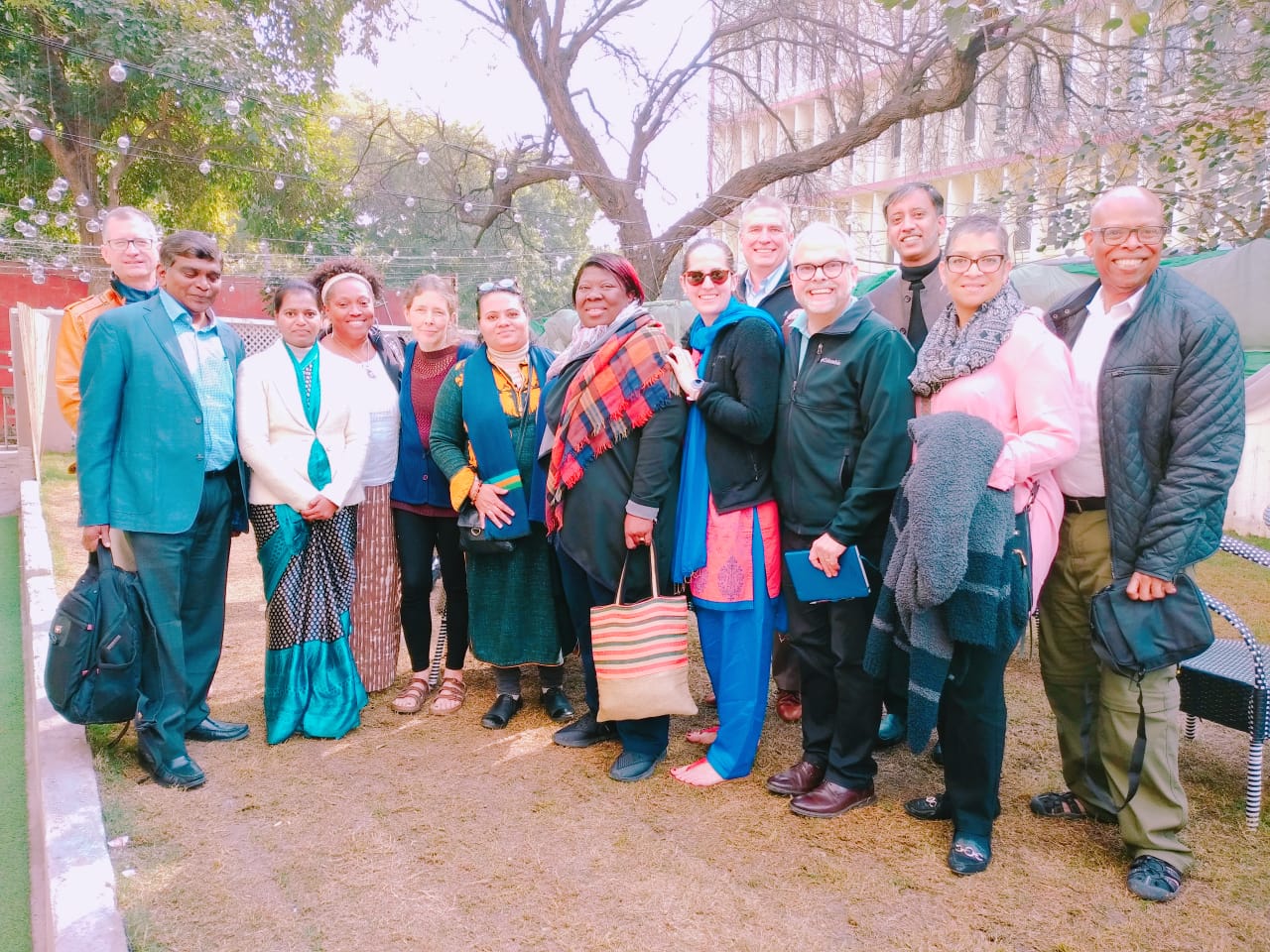 Today was our first full day in India and it was full of meetings and full of learnings and full of joy. We started our morning at the YWCA of India speaking with 3 human rights activists who all happen to be Christians. All three focus on different human rights work, but they all gave us a sense of what it is like to fight for the marginalized in India.
Today was our first full day in India and it was full of meetings and full of learnings and full of joy. We started our morning at the YWCA of India speaking with 3 human rights activists who all happen to be Christians. All three focus on different human rights work, but they all gave us a sense of what it is like to fight for the marginalized in India.
We heard about the rise of Hindu extremism and Hindu nationalism, which has been promoted by the government and given cover to people who spew hatred towards those considered “other.” The most recent example is that of the Citizenship Amendment Act (CAA), which will essentially strip the citizenship of anyone who can’t prove where their grandparents were born. This affects the poor, the low-caste, and those who have left their families – women who have married into a family in another town or village and those who are in the LGBTQ community whose families threw them out.
The caste system was explained to us and the struggles of the Dalit or “untouchable” people, who have been fighting for their basic human rights for centuries, were illustrated for us. We also learned about the protests and the fight for the rights of religious minorities. Christians are a minority community in India, so they fight for their rights as well as the rights of other religious minorities.
It was eerie hearing them talk about the political situation in India as we found it mirrored a lot of the things we are seeing in the United States with the rise of nationalism and demonization of Muslims. Right after our meeting, all three activists were headed to a protest where people were agitating against the new budget, which disinvests from social services and promotes making profits above all.
After our lunch, we met with people working on projects supported by Global Ministries, the Centre for Social Equity and Inclusion and WeEducate (Delhi Samaritans). Both projects work with the poor and marginalized to empower them to find solutions to their problems. We had hoped to visit their project sites, but it was the final day for campaigning before the State of Delhi’s elections and there were safety concerns for both us and the communities we would visit. So, we decided to meet with them at the Indian Social Institute instead.
These projects do amazing work with women, youth, and children from low caste and poor communities. They work in small communities and empower the people themselves to find solutions to their problems. One community group has started meetings for women who are victims of domestic abuse so they can support each other. WeEducate (Delhi Samaritans) provides after school tutoring to children, hoping to break the cycle of poverty. This whole trip we have been hearing from our partners that community-lead projects are the most effective way to bring about lasting change. I think we can learn from that.
Rebekah Choate
Associate for Global Advocacy and Education
Global Ministries
Day 9
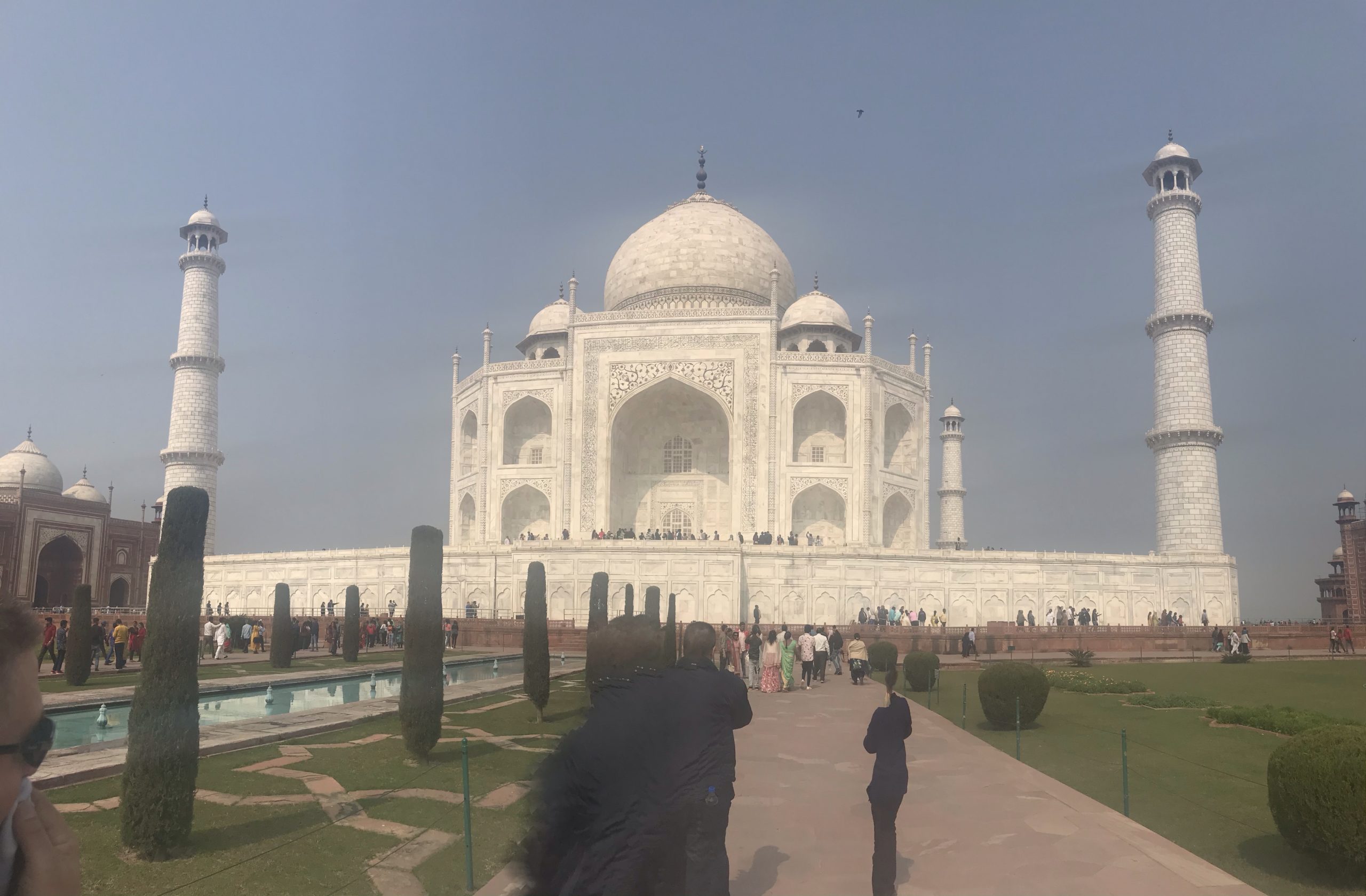 Yesterday our group spent a total of about eight hours on a bus to visit one of the world’s most beloved sites: the Taj Mahal.
Yesterday our group spent a total of about eight hours on a bus to visit one of the world’s most beloved sites: the Taj Mahal.
It was breathtaking.
With an able guide, we toured the grounds, saw this monument from all angles, went inside to view the tombs, and listened to the story of how and why this great architectural structure was built.
It is a testament to human creativity and ingenuity, of our collective desire to achieve lasting beauty. It is a marvel to behold. From carved spiral arched columns that span hundreds of feet from start to finish from a single piece of marble to the delicate and intricately patterned flowers that are embedded in the marble with precious and semi-precious gemstones from around the world – this tomb speaks of the indomitable spirit of human beings.
Like Notre Dame, Stonehenge, Machu Picchu, and the Gaudi Cathedral, the Taj Mahal becomes a collecting place for people the world over who are inspired when viewing such a structure.
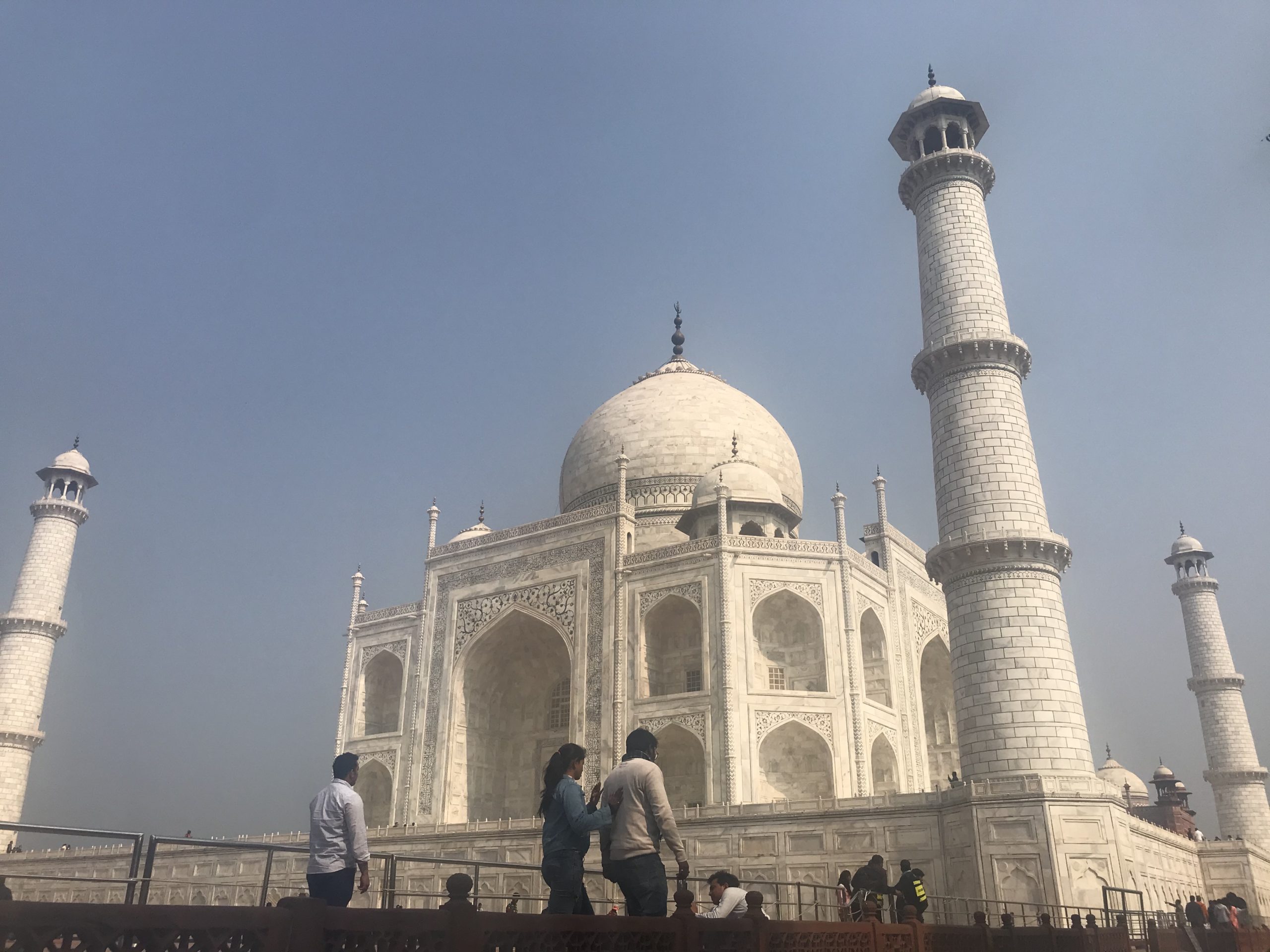 We joined that throng yesterday. Our hearts were stirred by the marvel of it. Shakespeare and the Psalmists words both come to mind: from Hamlet, the bard writes “What a piece of work is man;” and from Psalm 8 we read “O Lord, how majestic is your name in all the Earth. When I look at the heavens, the works of your hands, who are we that you are mindful of us. And yet you have made us little less than a God.”
We joined that throng yesterday. Our hearts were stirred by the marvel of it. Shakespeare and the Psalmists words both come to mind: from Hamlet, the bard writes “What a piece of work is man;” and from Psalm 8 we read “O Lord, how majestic is your name in all the Earth. When I look at the heavens, the works of your hands, who are we that you are mindful of us. And yet you have made us little less than a God.”
We are a species that marvels. Art and nature both inspire us. The Taj Mahal is common ground for the wonderer and the wanderer. In places like this, cultures stake their claim as artisans and architects. The world gathers in places like this to affirm that claim and to glorify our maker, by whatever name we call Her, for making us in God’s image and endowing us with the capacity and agency to create lasting beauty.
After two weeks of grueling and yet deeply enriching encounters with mission partners intent to change their world, today we gathered in the playground of their artisans. They did not disappoint.
Rev. Dr. John C. Dorhauer
General Minister and President
United Church of Christ
Day 10
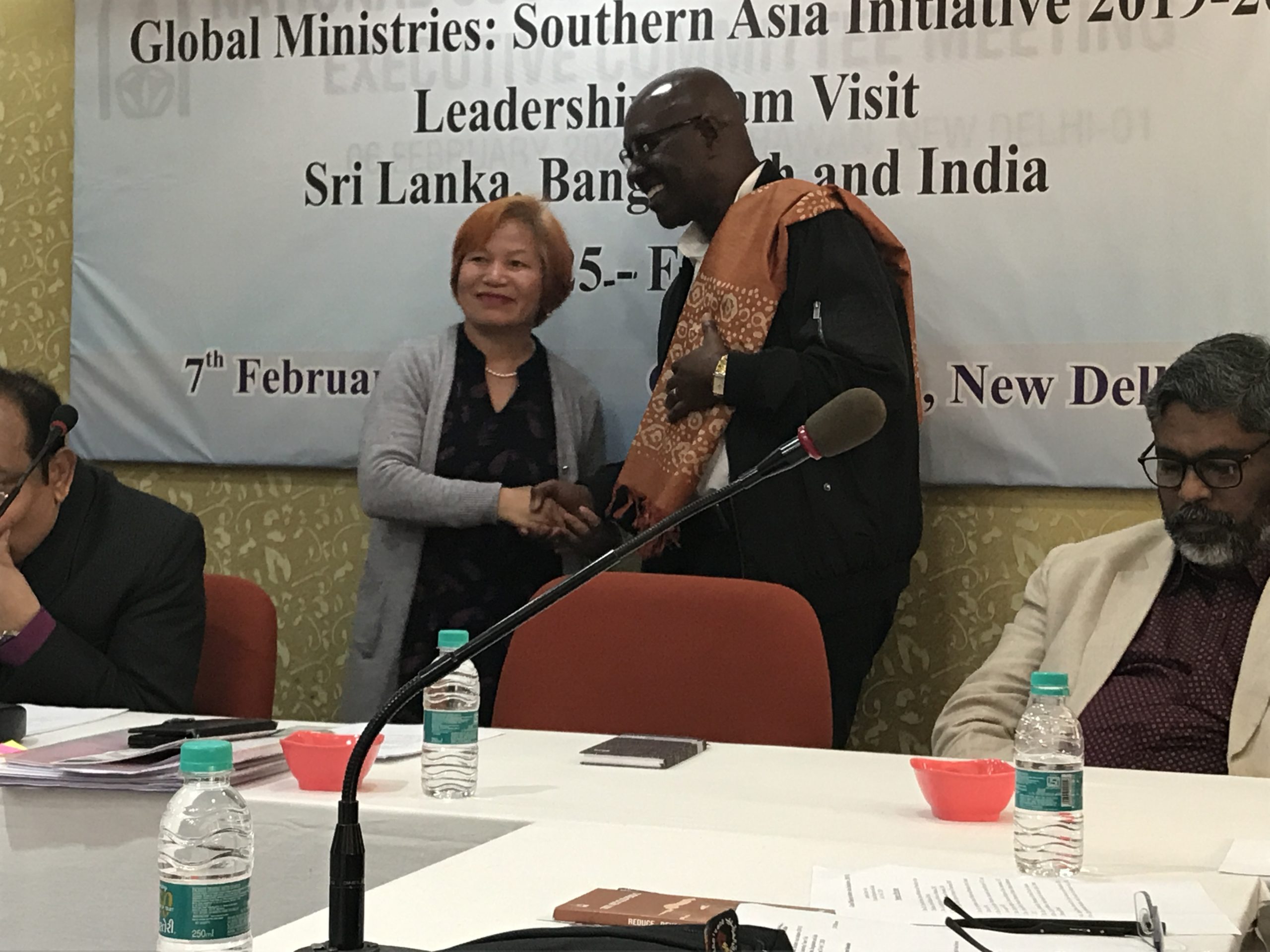 Today was our final day of the pilgrimage to Southern Asia. What an opportunity for Richard Bott, the Moderator of the United Church of Canada, and I to join our siblings in full communion, the United Church of Christ and the Christian Church (Disciples of Christ) from the USA during this pilgrimage. Certainly, our friendships were strengthened as we journeyed together on very busy and often crowded roads and streets.
Today was our final day of the pilgrimage to Southern Asia. What an opportunity for Richard Bott, the Moderator of the United Church of Canada, and I to join our siblings in full communion, the United Church of Christ and the Christian Church (Disciples of Christ) from the USA during this pilgrimage. Certainly, our friendships were strengthened as we journeyed together on very busy and often crowded roads and streets.
Today we had a reception hosted by the National Council of Churches in India (NCCI ). We had church leaders from member churches, regional Christian councils, all-India Christian organizations, related agencies, and some from autonomous bodies.
We received such warm hospitality. Our hosts showered us with gifts and plenty of food. It was a wonderful feeling of the wider body of the Christian Church which knows no border or race. As Deeenbandhu Manchala reminded us during the conversations ‘in Christ there is no caste.’
We came as pilgrims searching for signs of hope in the context of a broken world where violence is glorified, the earth is polluted, diversity is being scorned upon in favor of uniformity, where poverty abounds and the space for freedom of expression is shrinking day by day. The dignity of all persons and of the creation of God is surely under attack. We came so that we may be mutually encouraged. Indeed we have been challenged by our hosts and we go back with our hearts overflowing with gratitude and the lessons we have learned. The churches here in India are trying their best to live out the mission of sharing the good news of Jesus Christ and bringing hope to many. They are indeed a true reflection of what it means to be the church in a broken world.
We have witnessed many signs of hope in the stories and conversations we had. Even where public space is shrinking our siblings are seeking ways to continue their prophetic witness to life-affirming theologies. They are addressing injustice and discrimination within their context.
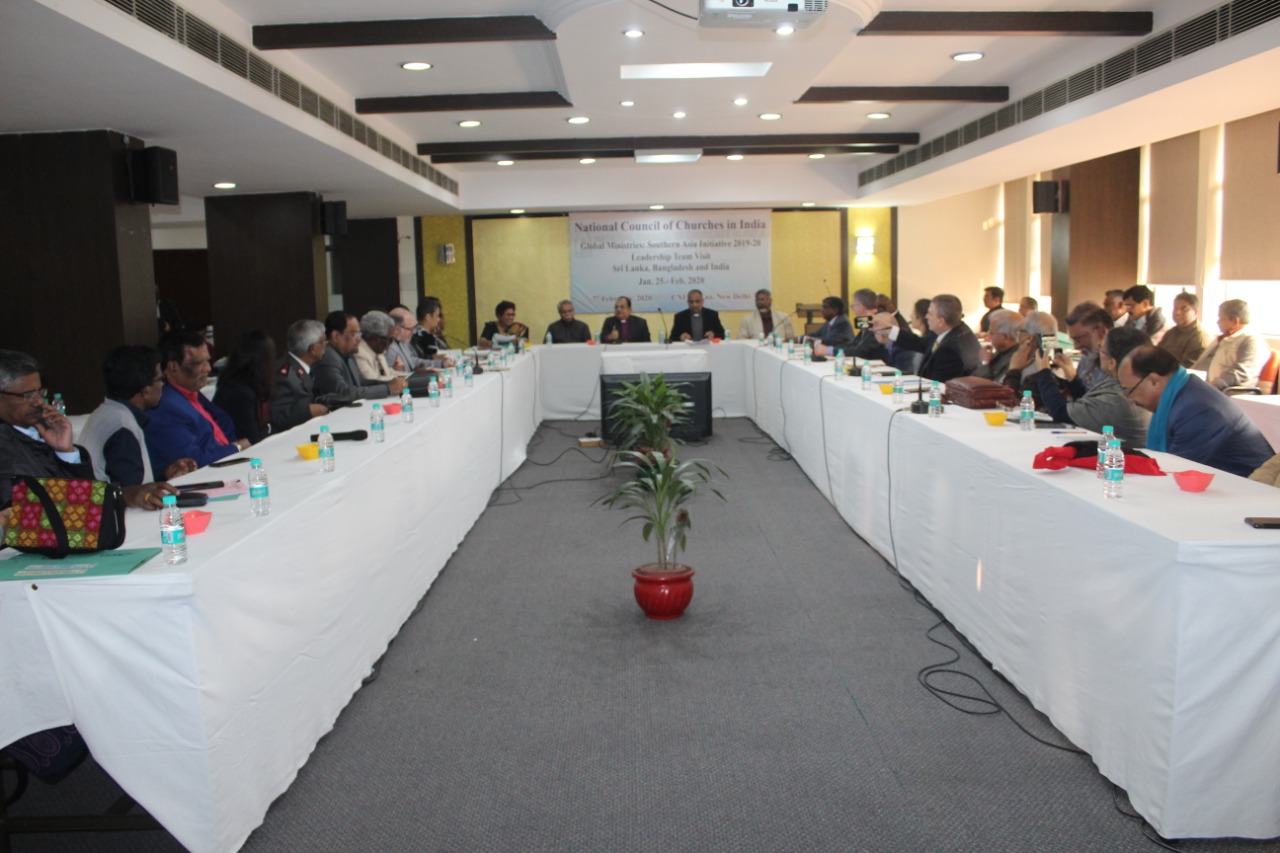 Through the work of the National Council of Churches in India or through members like the Church of North India or through a Diakonia arm like CASA (Churches Auxiliary for Social Action), they are spreading the message of love to all in need without discrimination.
Through the work of the National Council of Churches in India or through members like the Church of North India or through a Diakonia arm like CASA (Churches Auxiliary for Social Action), they are spreading the message of love to all in need without discrimination.
We heard powerful and moving stories of how the National Council of Churches in India is carrying out its ecumenical mandate of working towards just and inclusive communities. The Council and its constituent members are actively engaged in the spiritual work of encouraging one another as a minority religion in the country. They work on nation-building and social transformation. They are an inter-confessional autonomous Council which embraces, promotes and coordinates various kinds of activities for responsible life and witness, for upholding human dignity, for ecological and economic justice, for transparency and accountability, and for equity and harmony.
Additionally, we heard that CASA’s primary objective is to strengthen the poor and promote the efforts of marginalized groups towards sustainable development leading to social justice and self-sufficiency. CASA carries out its interventions irrespective of religion, ethnicity, and caste. They are working on emergency response and sustainable development.
The Church of North India shared with us their work through the Synodical Board of Social Services which is the development board of the Church of North India, working with the Dalit and Tribal communities to facilitate socio-economic transformation.
We concluded our time together in sharing personal reflections and shared in communion. What a beautiful way to end this pilgrimage
Karen Georgia Thomson reminded us of the words of the song by Kirk Franklin entitled “Let me touch you.” The first stanza says:
Let me touch You and see if You are real
Even though, I know my heart Your hands can heal
But sometimes I get discouraged
And I need Your strength and shield, Jesus
Let me touch You and see if You are real
As pilgrims, we testify that we have seen God as real through the people of India just as we saw through the people of Bangladesh and through the people of Sri Lanka as they carry out their justice-seeking ministries for all God’s creation.
We affirm that presence has encountered untouchability and critical knowledge and critical witness have been felt and experienced. We all shared how we enjoyed this pilgrimage and affirmed that it was important to have such pilgrimages as they leave life-changing impacts on what it means to be Church in such a time as this.
The gift of presence is surely the most important. We will, therefore, be as living letters, together with hope.
Let me end with the words which I feel capture what I experienced today in all those presentations and conversations we had.
They say broken, I say healing.
They say tired, I say working.
They say ‘lost cause’, I say seeking.
They say beaten, I say rising.
I say home.
And home is not just where the heart is, Home is what the whole body is.
“Heart” by Katherena Vermette
Rev. Dr. Japhet Ndhlovu
Program Coordinator for South Asia and Southern Africa
United Church of Canada

